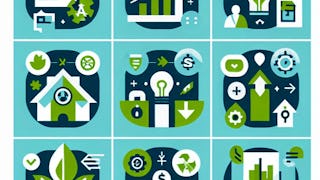- Browse
- Environmental Economics
Environmental Economics Courses
Environmental economics courses can help you learn about resource allocation, cost-benefit analysis, and the economic impacts of environmental policies. You can build skills in evaluating environmental regulations, analyzing market failures, and assessing sustainability practices. Many courses introduce tools like economic modeling software and data analysis techniques, that support conducting environmental impact assessments and informing policy decisions.
Popular Environmental Economics Courses and Certifications
 Status: FreeFreeP
Status: FreeFreePPrinceton University
Skills you'll gain: Risk Analysis, Analysis, Systems Thinking, World History, International Relations, Social Network Analysis, Financial Systems, Public Health, Governance, Epidemiology, Complex Problem Solving, Economics, Supply Chain
4.7·Rating, 4.7 out of 5 stars427 reviewsBeginner · Course · 1 - 3 Months
 Status: Free TrialFree TrialF
Status: Free TrialFree TrialFFundação Instituto de Administração
Skills you'll gain: International Relations, Diplomacy, World History, Cultural Sensitivity, Intercultural Competence, Cultural Diversity, Political Sciences, European History, Governance, Economics, Economic Development
4.3·Rating, 4.3 out of 5 stars10 reviewsBeginner · Course · 1 - 4 Weeks
 Status: Free TrialFree TrialF
Status: Free TrialFree TrialFFractal Analytics
Skills you'll gain: Decision Making, Critical Thinking, Analytical Skills, Behavioral Economics, Problem Solving, Data Analysis, Cooperation, Artificial Intelligence, Emotional Intelligence, Self-Awareness, Communication, Algorithms
4.9·Rating, 4.9 out of 5 stars38 reviewsBeginner · Course · 1 - 4 Weeks
 Status: Free TrialFree TrialK
Status: Free TrialFree TrialKKeller Williams
Skills you'll gain: Administrative Support, Office Management, Real Estate, Organizational Skills, Real Estate Transactions, Business Planning, Business Management, Financial Planning, Professional Networking, Law, Regulation, and Compliance, Compliance Management, Vendor Relationship Management, Goal Setting, Business Economics
4.7·Rating, 4.7 out of 5 stars21 reviewsBeginner · Course · 1 - 3 Months
 Status: Free TrialFree TrialU
Status: Free TrialFree TrialUUniversity of Colorado Boulder
Skills you'll gain: Sustainable Business, Corporate Sustainability, Stakeholder Engagement, Environmental Social And Corporate Governance (ESG), Sustainability Reporting, Performance Measurement, Strategic Partnership, Sustainable Development, Corporate Strategy, Sustainability Standards, Supply Management, Procurement, Business Strategies, Business Operations, Strategic Communication, Business Leadership, Organizational Strategy, Supply Chain Management, Systems Thinking, Communication
4.4·Rating, 4.4 out of 5 stars28 reviewsBeginner · Specialization · 1 - 3 Months
 Status: PreviewPreviewP
Status: PreviewPreviewPPontificia Universidad Católica de Chile
Skills you'll gain: Health Systems, Health Care Administration, Health Policy, Health Care, Health Equity, Healthcare Industry Knowledge, Public Health, Governance, Health Disparities, Economics
Build toward a degree
4.8·Rating, 4.8 out of 5 stars23 reviewsBeginner · Course · 1 - 4 Weeks
 Status: Free TrialFree TrialP
Status: Free TrialFree TrialPPeking University
Skills you'll gain: Object Oriented Design, Object Oriented Programming (OOP), C (Programming Language), Programming Principles, Computer Programming, Data Structures, Software Engineering, Debugging, Algorithms
4.9·Rating, 4.9 out of 5 stars827 reviewsMixed · Course · 1 - 3 Months
 Status: Free TrialFree TrialA
Status: Free TrialFree TrialAArizona State University
Skills you'll gain: Program Implementation, Plan Execution, Sustainable Development, Business Planning, Data Analysis, Sustainability Reporting, Spreadsheet Software, Contract Management, Waste Minimization, Marketing and Public Relations, Analysis, Sustainability Standards, Policy Development, Annual Reports, Interactive Learning, Sustainable Business, Vendor Contracts, Goal Setting, Business Writing, Project Management
4.4·Rating, 4.4 out of 5 stars92 reviewsBeginner · Specialization · 3 - 6 Months
 Status: PreviewPreviewU
Status: PreviewPreviewUUniversity at Buffalo
Skills you'll gain: Building Design, Sustainable Technologies, Sustainable Development, Energy and Utilities, Electrical Power, Sustainable Architecture, Sustainable Engineering, Workforce Planning, Gap Analysis, Climate Change Mitigation, Training Programs, Emerging Technologies, Professional Networking, Semiconductors
4.7·Rating, 4.7 out of 5 stars227 reviewsBeginner · Course · 1 - 3 Months
 Status: PreviewPreviewU
Status: PreviewPreviewUUniversity of Geneva
Skills you'll gain: Water Resources, Water Resource Management, Climate Change Adaptation, Water Sustainability, Arbitration, Mediation, Environmental Laws, International Relations, Environmental Regulations, Conflict Management, Case Law
4.8·Rating, 4.8 out of 5 stars61 reviewsIntermediate · Course · 1 - 3 Months
 Status: PreviewPreviewU
Status: PreviewPreviewUUniversità Bocconi
Skills you'll gain: Project Finance, Environmental Social And Corporate Governance (ESG), Investments, Contract Management, Risk Analysis, Finance, Corporate Finance, Risk Management, Sustainable Development, Economics, Public Policies
4.5·Rating, 4.5 out of 5 stars8 reviewsBeginner · Course · 1 - 3 Months
 Status: Free TrialFree Trial
Status: Free TrialFree TrialSkills you'll gain: HVAC, Building Services Engineering, Thermal Management, Mechanical Engineering, Engineering Calculations, Energy and Utilities, Estimation, Environmental Issue
4.4·Rating, 4.4 out of 5 stars46 reviewsIntermediate · Course · 1 - 4 Weeks
Searches related to environmental economics
In summary, here are 10 of our most popular environmental economics courses
- Global Systemic Risk : Princeton University
- Geopolítica e seus Movimentos Interculturais: Fundação Instituto de Administração
- Human Decision Making and its Biases: Fractal Analytics
- Manage a Real Estate Business: Keller Williams
- Sustainability for Business: University of Colorado Boulder
- Sistemas y modelos de organización de la atención en salud: Pontificia Universidad Católica de Chile
- C程序设计进阶: Peking University
- Sustainability Analyst Fundamentals: Arizona State University
- Renewable Energy: Fundamentals and Job Opportunities: University at Buffalo
- Droit International de l'Eau Douce: University of Geneva










